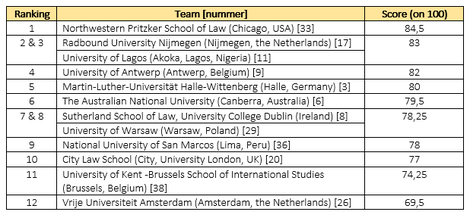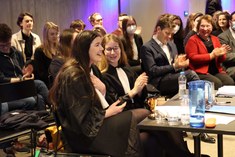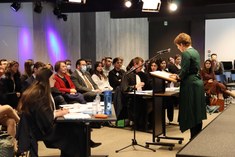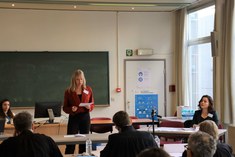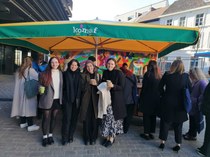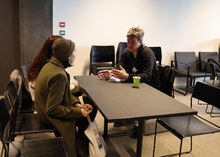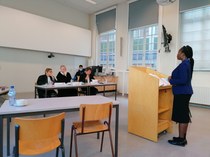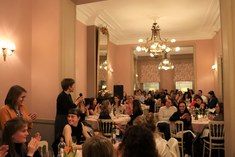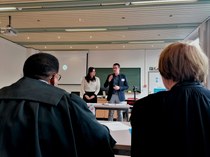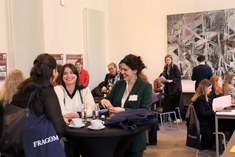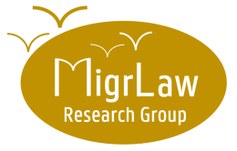International Migration and Refugee Law Moot Court Competition - Ghent, March 2022
General Information
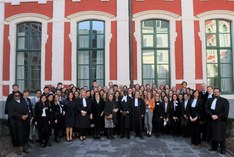
Next edition
The next edition of the International Migration Moot Court will be organised by the winners of the 2022 edition: the University of Antwerp (Belgium). The international pleading competition will be organized again in the academic year 2023-24.
For mor information, please check the University of Antwerp's dedicated webpage on the International Migration and Refugee Law Moot Court Competition.
Moot Court structure
The moot court competition consisted of a written round and a two-day oral round in Ghent (Belgium). Each team pleaded a fictitious case between a State and a migrant before a judicial body. A particular and challenging characteristic of the International Migration and Refugee Law Moot Court Competition was that the case developed throughout the competition. Great importance was given to the students’ learning experience, and collective as well as individual feedback session between the teams and the judges were organised.
- The written pleadings
Each team had to submit written pleadings on behalf of both the State and the migrant. The written pleadings could not exceed 6000 words for each party (excluding footnotes). An international evaluation panel has evaluate these written pleadings. The 12 teams scoring best on the written pleadings, were for the oral hearing in Ghent.
- The oral pleadings
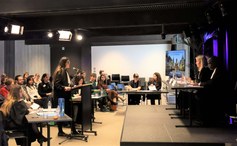
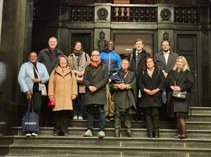
Judges were experts in the field of asylum and migration law, thanks to a collaboration with the International Association of Refugee and Migration Judges.
- Timeline
Moot Court Case, Rules and Booklet
The 2022 International Migration and Refugee Law Moot Court Competition case concerns a national of the Syrian Arab Republic, who asks for international protection in the People’s Republic of Kalakuta, a fictitious country.
You can find the Case on this link, as well as the new element for the semi-final and the new case for the final.
The Competition’s Rules, can be consulted on this link.
The Clarifications, are accessible via this link.
The Annex to the Competition's Rules, with regards to Virtual Oral Pleadings, can be consulted on this link.
And more information about the competition, including the finalized programme, information about main and side events, the names of the judges and practical information for the participants can be found in this booklet.
Participation
The competition was open to teams from all countries in the world (only 1 per university), and in total 40 teams of 23 different countries signed up. Teams came from: Afghanistan, Armenia, Australia, Bangladesh, Belarus, Belgium, Croatia, Egypt, Ethiopia, Germany, Kenya, India, Iran, Ireland, Netherlands, Nigeria, Peru, Poland, South-Africa, Turkey, Uganda, UK, and USA.
Teams advanced to the oral rounds
The following teams qualified for the oral rounds as their written pleadings received the highest scores by the Members of the Evaluating Committee:
Thanks to the generous financial support of the international migration law firm Fragomen and the Global Minds Fund of Ghent University, the following two teams will be awarded a travel grant:
- University of Lagos (Akoka, Lagos, Nigeria)
- National University of San Marcos (Lima, Peru)
Finalist & awards
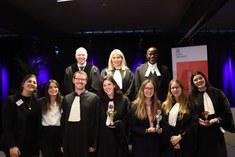
The winner of the competition was the University of Antwerp (Belgium) and the runner-up City Law School (University of London, UK).
Awards were further granted to Northwestern Pritzker School of Law (Chicago, USA) for the best written pleading on behalf of the applicant, and City Law School (University of London, UK), for the best written pleading on behalf of the respondent.
Side events
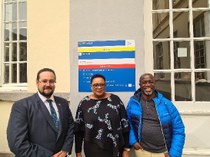
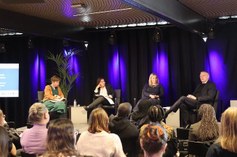
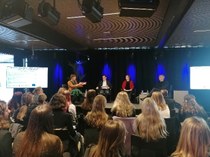
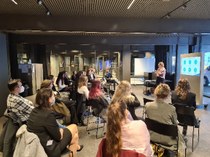
Pictures of the event
Organisation Team
Migration Law Research Group (MigrLaw), with as coordinators Prof. Ellen Desmet and Birte Schorpion.

